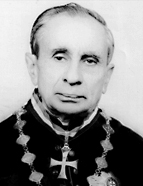

AJC's academic career was characterised by great dedication to the Faculdade de Letras da Universidade de Coimbra, particularly in teaching and research, which will be discussed shortly. From an administrative standpoint, he held several positions, including Director of the Curso de Bibliotecário-Arquivista [Librarian-Archivist Course], a role he held from October 1963 until his retirement. He was also Director of the Instituto de Estudos Históricos Doutor António de Vasconcelos [Institute of Historical Studies of Doctor António de Vasconcelos] at the same Faculty (1966-1975), where he oversaw its scientific journal, the Revista Portuguesa de História [Portuguese Journal of History]. Known for his extremely discreet personality — so much so that, during the turbulent days of the April Revolution in 1975, he never claimed the prerogatives of his position as Dean of the Faculty — his greatest achievement, as well as his greatest joy, was the creation of the Instituto de Paleografia e Diplomática [Institute of Palaeography and Diplomatics] at the Faculdade de Letras da Universidade de Coimbra in 1974, which he directed until his retirement. In another area of university life, on 20 March 1966, he was responsible for giving praise to Doctors Alexandre Fradique Morujão, Sebastião José da Silva Dias, Victor Raul da Costa Matos, and Walter de Sousa Medeiros at their solemn doctorates.
He was a member of the Portuguese Subcommittee of the Commission Internationale d'Histoire Ecclésiastique Comparée, part of the Comité International des Sciences Historiques. Additionally, he served on the 3rd Section of the Junta Nacional da Educação [National Board of Education] (1966-1977). Alongside Bishop Miguel de Oliveira, Rev. Dr. A. da Silva Rego, and Fr. António Brásio, he was part of the organising committee that founded the Centro de Estudos de História Eclesiástica [Centre for Studies in Ecclesiastical History] in 1956 and its journal, Lusitania Sacra, of which he was a long-standing member of the editorial committee. He was also a member of the Academia Portuguesa da História [Portuguese Academy of History], the Associação dos Arqueólogos Portugueses [Association of Portuguese Archaeologists], an emeritus member of the Sociedade Portuguesa de Estudos Medievais [Portuguese Society for Medieval Studies], and abroad, a member of the Comité International de Paléographie Latine (elected emeritus in 1979) and the Commission Internationale de Diplomatique. His brilliant career was recognised in 1971 when he was awarded the insignia of Commander of the Order of Prince Henry the Navigator.
